Digital future becomes a reality for learners at Gloucestershire Hospitals
Immersive technologies like virtual reality (VR) are being used to support a more interactive, collaborative and student-centred approach to learning at Gloucestershire Hospitals.
Simulation-based education (SBE) is already being used within the Trust, including the use of high-tech mannikins, all with the ability to realistically mimic life-like responses to different medical procedures. The addition of immersive technologies further enhances the move to embrace Technology Enhanced Learning (TEL).
Immersive learning experiences allow users to interact with 3D objects within simulated environments, enhancing the learning process. These immersive technologies collectively provide users with realistic experiences in augmented or virtual environments.
Simulation Based Education (SBE) aims to replace or amplify real-life experiences with guided experiences, which are often immersive in nature. Professional Education Simulation Fellow Emily Barnfield advises that SBE aims to bridge the gap between theory and practice through interactive teaching strategies, adding that the debrief that follows simulation-based scenarios is a great opportunity to encourage reflection, learn and share feedback.
Stephen Lewis has recently been appointed as the Trust’s Immersive Learning Technology Officer (ILTO). This nationally-funded technical support role is designed to help NHS organisations test and evaluate immersive learning technologies in healthcare training.
Stephen explains: “Immersive technologies can be used to train students and medical professionals, offering interactive learning experiences before real-world patient encounters. Compared to traditional learning methods such as books and videos, this approach can often reduce learning time and improve people’s understanding of techniques.
“Users can realistically visualise themselves in different scenarios and gain a better understanding of real-life outcomes. research has shown that immersive technologies enhance engagement levels, leading to improved performance and application of knowledge.”
We want to ensure that all learners in our organisation can benefit from the latest teaching methods as we continue to offer innovative training and development opportunities.
Emily Barnfield, Simulation Fellow
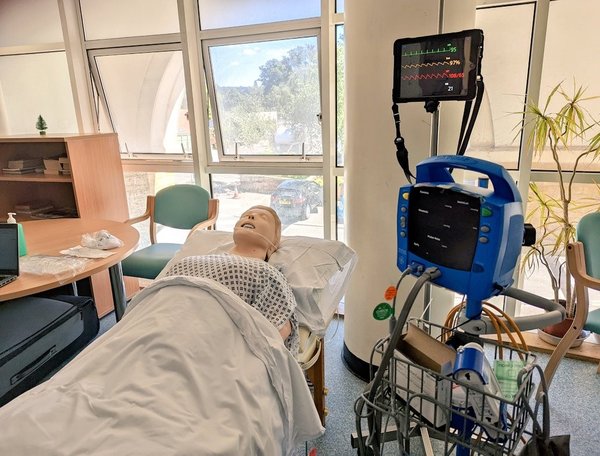
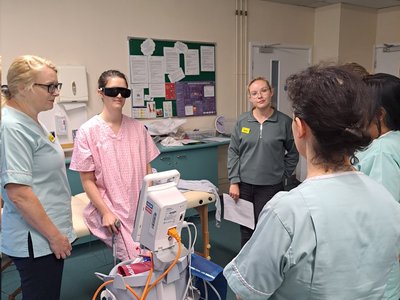

Recently, ‘Introduction to Simulation’ pilot sessions were introduced at Gloucestershire Hospitals to develop our Health Care Support Workers' (HCSWs) essential skills, providing an opportunity for many to engage in simulation for the very first time. These sessions feature a ‘what-if’ tabletop exercise, a standardised patient simulation scenario and two immersive virtual reality experiences.
The first of these experiences is the Enhanced Health and Care Homes programme developed by NHS England, which allows users to step into a 360-degree video simulation featuring interactive questions which are designed to enhance skills in caring for residents in care homes. NHS England has been exploring various initiatives to support the use of virtual reality (VR) and other innovative technologies in healthcare training.
Visual impairment VR experience
The second of these experiences is our locally developed virtual reality simulation, allowing users to experience a first-hand perspective of a patient with a vision impairment. It features some common activities and interactions that occur with healthcare professionals in this setting and allows users to experience how this environment may appear to a patient with up to five different types of visual impairments. In these sessions, participants define how they perceive person-centred care and explore how patient experience can be improved with simple interventions.
Stephen Lewis: “VR experiences can help healthcare professionals develop a deeper understanding of the challenges faced by individuals with sight loss. By immersing themselves in virtual environments that simulate visual impairments, trainees can gain empathy, sensitivity and awareness, which are essential qualities for delivering patient-centred care. Our visual impairment training was received positively during our pilots. Experiencing a first-hand patient perspective fostered empathy, patience, and a desire to improve patient experience.
Emily comments: “While we thought that the enjoyment of VR training might vary according to different age groups, we found that preferences depend instead on broader factors such as job roles, familiarity with technology and individual learning styles.”
Stephen and Emily are also exploring the development of virtual reality conversational simulations powered by Artificial Intelligence (AI). Steve explains: "Although this is still in the very early stages of development, AI is enabling us to simulate patients with predefined medical histories. Learners can have a natural conversation with a virtual patient, who will respond to their questions vocally and emotionally, and perform any requested actions."
Immersive technologies have enormous potential because they will revolutionise how we engage with the world around us and each other. By incorporating immersive technologies into learning here at Gloucestershire Hospitals, we can harness this technological revolution to improve how we care for patients.
Stephen Lewis, Immersive Learning Technology Officer
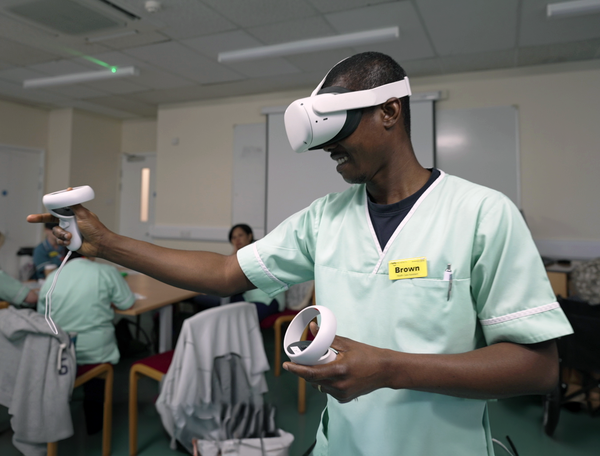
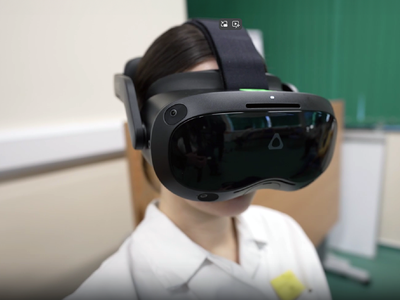
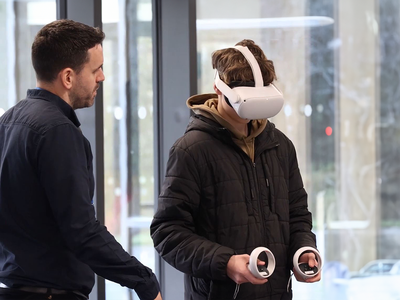
Gloucestershire Hospitals aspires to be recognised as a leading organisation in SBE and TEL with a highly skilled workforce that feels valued and has equitable access to high-quality training opportunities.
Emily says: “We want to identify further areas across all departments within the Trust where immersive learning and simulation technologies can be expanded to have the biggest impact to enhance learning. We invite colleagues from across the Trust to contact us to discuss how we could work together.”